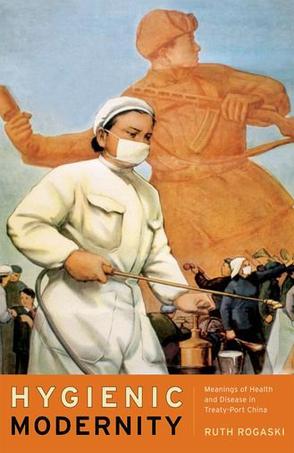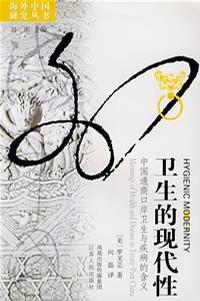欢迎来到相识电子书!
标签:罗芙芸
-
Hygienic Modernity
Placing meanings of health and disease at the center of modern Chinese consciousness, Ruth Rogaski reveals how hygiene became a crucial element in the formulation of Chinese modernity in the nineteenth and twentieth centuries. Rogaski focuses on multiple manifestations across time of a single Chinese concept, weisheng—which has been rendered into English as "hygiene," "sanitary," "health," or "public health"—as it emerged in the complex treaty-port environment of Tianjin. Before the late nineteenth century, weisheng was associated with diverse regimens of diet, meditation, and self-medication. Hygienic Modernity reveals how meanings of weisheng, with the arrival of violent imperialism, shifted from Chinese cosmology to encompass such ideas as national sovereignty, laboratory knowledge, the cleanliness of bodies, and the fitness of races: categories in which the Chinese were often deemed lacking by foreign observers and Chinese elites alike. -
卫生的现代性
以中国中心的意识,罗芙芸揭示了卫生如何在19、20世纪成为中国的现代性表述中的紧要因素。她集中于一个中文概念“卫生”,作为贯穿时空和多样性的线索,并将其置于天津复杂的通商口岸环境之中。在19世纪末以前,卫生——被译为“卫生的”、“清洁的”、“健康”或“公共卫生”——与之相关的是饮食方、冥想和秘制方药。本书揭示了随着暴力帝国主义的到来,卫生的意义是如何从中国人的宇宙观转变为包含了诸如国家主权、科学实验、身体净化和民族适应性等方面的概念。外国人和中国的精英们往往认为,中国人在这些方面都有所缺乏。这项令人耳目一新的研,究向我们展示了卫生怎样在中国的现代性中成为一个矛盾的概念想象中的外国典范是其集中表现,同时也正是这些卫生的主要建造者一手造成了中国的缺陷。 罗芙芸描述了天津孤立的军事、政治事件与卫生变迁的交汇点——空间的安排、水的供应、对身体的关注、对排泄物的处理。本书展示了围绕着天津的卫生变迁,各自为政的帝国主义势力如何应对,同时,在帝国主义者的目标与现代化精英的目标之间,搭建起一条重要的纽带。本书的时间跨度从鸦片战争直至朝鲜战争,作者解释了卫生的现代性不仅改变了一座城市,还塑造了中国人对于在立足于现代世界的卫生要求的认知。 序言 导言 第一章 “包治百病”:20世纪前的卫生 第二章 天津的卫生与疾病 第三章 医学的遭遇与分流 第四章 中国通商口岸的卫生翻译 第五章 日本明治时期卫生翻译的转变 第六章 缺陷和主权:天津被占领期间的卫生现代性,1900—1902 第七章 可见与不可见:城市景观和卫生的边界 第八章 卫生和现代性的渴望 第九章 日本人在天津的细菌管理 第十章 细菌战和爱国卫生 结语 参考书目
热门标签
下载排行榜
- 1 梦的解析:最佳译本
- 2 李鸿章全传
- 3 淡定的智慧
- 4 心理操控术
- 5 哈佛口才课
- 6 俗世奇人
- 7 日瓦戈医生
- 8 笑死你的逻辑学
- 9 历史老师没教过的历史
- 10 1分钟和陌生人成为朋友


